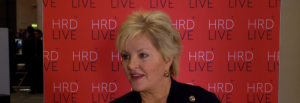What is corporate responsibility?
- 5 Min Read
Do businesses take the correct amount of corporate responsibility when it comes to employees?
- Author: Eric Craig
- Date published: Nov 9, 2018
- Categories

 Businesses are teetering on the precipice of perhaps two of the greatest threats of our time. Firstly, the environment is at breaking point. Despite UN sustainable development goals and thousands of blue and red-chip companies working to reduce their waste, water and carbon outputs, we’re facing an unprecedented number of severe weather conditions across the globe. Research continually reinforces the delicate balance on which our environment is wavering, we need constructive change now and it needs to be a partnership approach, not reliant on business alone.
Businesses are teetering on the precipice of perhaps two of the greatest threats of our time. Firstly, the environment is at breaking point. Despite UN sustainable development goals and thousands of blue and red-chip companies working to reduce their waste, water and carbon outputs, we’re facing an unprecedented number of severe weather conditions across the globe. Research continually reinforces the delicate balance on which our environment is wavering, we need constructive change now and it needs to be a partnership approach, not reliant on business alone.
The second threat is people, more specifically inactivity. Wellbeing appears to be at an all-time low. Employees are stressed, tired and ill prepared for giving their best at work, despite employers’ best efforts, the situation doesn’t seem to be getting any better.
What can HR do to address these burning issues?
Whilst many are addressing these issues via Corporate Social Responsibility (CSR), it still seems to me that businesses are missing a trick. They are failing to spot one key area where environmental and business performance can be improved, simultaneously.
The answer comes from a partnership approach, bringing together employees to engage them around wellbeing and the environment, including thinking about the daily commute.
It’s time to engage them more about the environment, and what they can do to make a difference. Consumers are far more concerned now than they used to be – just look at the backlash against plastic. This engagement piece includes how they get to and from work. This won’t be practical for all – according to a recent study by the University of the West of England, one in seven commuters are now spending two hours or more each day traveling to and from work. However, for those who live perhaps within an eight-mile radius or so, commuting by bike is in many instances quicker and certainly healthier, it could be a chance to marry up environmental commitments with wellbeing. Simply providing your team with bikes isn’t the answer, we believe you need to reward behaviour and give them a sense of ownership and responsibility.
By encouraging employees to change their commute – particularly making it an active commute by walking or cycling – firms could suddenly see carbon savings and a more environmentally-friendly supply chain. Plus, they’d achieve a happier, healthier workforce – a win-win for all. For a country struggling with productivity and engagement, perhaps this alignment could be the difference.
For example, when businesses present their CSR reports, I don’t see them factoring in their employees’ effect. For a firm employing just 50 people, with 80% driving in, this is a significant carbon output. Twelve years ago the Carbon Trust estimated each person generates roughly a ton of carbon on their commute alone. Move that on to modern day and the extended journeys we’re now undertaking to get to work, I’d wager it’s higher. So now do the calculations – that’s 40 tons of CO2 this small company is responsible for. Make that one of the UK’s leading employers, and suddenly there’s thousands of tons of carbon in the supply chain that’s unaccounted for.
Holistic approach
If firms measured their output, they’d be shocked, and it may soon become a metric that they can no longer ignore. Measuring and reporting on an individual employee’s carbon footprint is integral in helping businesses understand the impact, and one of the key motivations behind our own innovative approach to the problem. For example, we use Department of Transport and NHS benchmarks and granular data to provide organisations with meaningful environmental savings and staff activity levels data, simply by incentivising people to ride a bike and tracking their mileage. I fully expect this holistic, yet effective approach to catch on.
Imagine the difference we could see if there was a change in behaviour. This saving can then be measured and documented in sustainability reports, demonstrating the behaviour of responsible employers.
It would also directly influence the other big issue affecting businesses – employee wellbeing. Giving up the car journey to work and getting active will have a massive bearing on how well an employee is, and how effective they are at work. Physically active employees are more productive, take fewer sick days and will be more energetic within the business. At free2cycle, are working with businesses to encourage this behaviour change via our proposition and are seeing a significant difference, it’s just triggering that initial behaviour change. I don’t need to lecture on the benefits but we have two birds and one stone, surely this is a cause worth championing?
The corporate world has shifted massively in the last ten years, and I have no doubt it will again over the next ten. However, what we can’t ignore is that HR has the opportunity to effect real change and in fact be the driving force behind how we encourage mobility in the coming years. It used to be the norm to walk to work – I don’t foresee us moving back to that model but engaging employees around this conversation is an opportunity which should not be passed by.
Marrying up CSR and talent could give solutions to the biggest costs firms face (low productivity, absenteeism, time lost to traffic), so now is the time to grab the bull by the horns and start these conversations. Yes, the likelihood is it won’t change the status quo massively or overnight; but let’s not forget the theory of marginal gains. If it works for Olympians, it could be the start of a step-change for your business.
About the author
Eric Craig is CEO of social enterprise free2cycle, which aims to encourage a fitter, healthier, more productive workforce by encouraging them to cycle to work; benefitting employees, employers and the environment.









